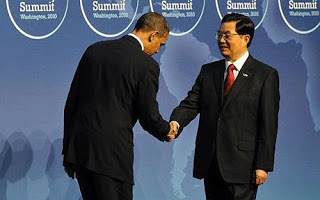G20 leaders gather in Seoul this week ready for a showdown amid tensions over the future of the global economy.
 |
| Getty image – Telegraph |
Philip Aldrick and Emma Rowley
Telegraph
The daisy chains, kaftans and sweet haze of pot may have been missing, but last year’s G20 summit in Pittsburgh was the closest to a love-in that the world’s leaders have come. In the eye of the financial crisis, with recession gripping most major economies, heads of state joined hands and agreed to promote “strong, sustainable and balanced growth”.
Those dangerous, destabilising global imbalances would be addressed, they pledged. “Deficit” countries, such as the UK and US, would save and export more. “Surplus” countries, such as China and Germany, would export less and get their consumers spending. Every country would do their bit, pull together, and all the bountiful progress would be chronicled the following year at the G20 summit in Seoul.
Unfortunately, relationships formed under intense circumstances rarely last. This week, with most countries a year out of recession, G20 leaders reconvene in Seoul to discuss their efforts. Twelve months on, nationalism has replaced globalism. Peace and love have given way to currency wars. The imbalances are as entrenched as ever. And, most frightening, the battle drums are beating for protectionism and trade barriers.
At last month’s International Monetary Fund (IMF) meeting, the mood was sombre. Dominique Strauss-Kahn, head of the IMF, spoke of “a new kind of economic co-operation at the global level which never had existed in the past [that] was very strong [at the G20] in London, very strong in Pittsburgh. I think it is fair to say that the momentum is decreasing.”
The European Central Bank president, Jean-Claude Trichet, also warned that while “we have a consensus on imbalances, the problem is implementation – as always”.
The US last week stoked the simmering tensions by unveiling plans for another $600bn (£370bn) of quantitative easing (QE), on top of the $1.7 trillion already in place. The dollar crashed in what is being seen as the latest round of competitive devaluations, as nations seek to debase their currencies to help domestic industry.
Brazil retaliated by buying dollars. Xia Bin, a member of the Chinese central bank’s monetary policy committee, branded the US stimulus plan “abusive” and warned it could spark a new global downturn. German finance minister Wolfgang Schäuble accused the US of breaking the promise made at June’s G20 in Toronto, saying he would “speak critically about this at the G20 summit in South Korea”.

Be the first to comment on "G20 tensions rise over the future of the global economy"